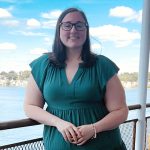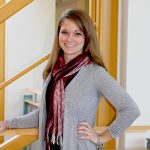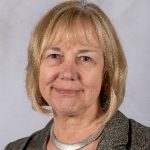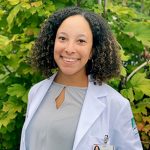 Blake Brandes graduated from UConn in 2016 with a B.A. in Human Development and Family Studies and a concentration in Early Childhood Development and Education. Upon completion of the early childhood program, supervised practicum, and student teaching placements in the UConn Child Labs, Blake earned the State of Connecticut Early Childhood Teacher Credential (ECTC) through the Office of Early Childhood.
Blake Brandes graduated from UConn in 2016 with a B.A. in Human Development and Family Studies and a concentration in Early Childhood Development and Education. Upon completion of the early childhood program, supervised practicum, and student teaching placements in the UConn Child Labs, Blake earned the State of Connecticut Early Childhood Teacher Credential (ECTC) through the Office of Early Childhood.
During her time at UConn, Blake devoted 300 hours of service to local preschoolers through the Jumpstart program as an AmeriCorps Member. She also was involved with UConn Hillel, serving as the Vice President of Tzedek (Social Justice) in 2015. In addition, Blake was a student worker at the Child Labs after completing her student teaching practicum course.
After graduating from UConn, Blake began her career with a private child care program as a Lead Infant Teacher for one year, and then became a Preschool Teacher at Stony Brook University’s child care center, Stony Brook Child Care Services (SBCC), for two years. Her education and hands-on experiences from the HDFS and early childhood programs greatly influenced her teaching philosophy and prepared her to be an effective early childhood teacher. Blake completed her M.A. in Liberal Studies at Stony Brook University with specializations in Child Development and Leadership Studies in 2021.
During her time at SBCC, Blake developed an unexpected enthusiasm for mentoring young adults, as SBCC serves as a practicum site for an undergraduate psychology internship course at Stony Brook University. Blake assisted in leading a seminar course for the interns and supervised their placement hours in the classroom she co-led.
Blake’s new interest in mentoring young adults led her back to Jumpstart, the program that ignited her passion for early childhood care and education. She has been working with Jumpstart since January 2020 as the Site Manager at Southern Connecticut State University (SCSU). Jumpstart’s mission is to ensure every child enters kindergarten prepared to succeed, and specifically focuses their efforts to benefit children who come from underserved communities. In her role at Jumpstart, Blake recruits, trains, and coaches 35-40 SCSU students each year to implement high-quality supplemental curricula in preschool classrooms in the New Haven community. Her education and experiences in the HDFS and ECDE programs are still relevant and valuable in this work, as she is able to share her knowledge of child development and early education best practices with the college students she supervises and coaches in Jumpstart.
Blake lives with her boyfriend of 6 years, Dan, and their cat, Lexi, in Newington, Connecticut. Outside of work, she enjoys reality television, musical theater, and spending time with loved ones. She is extremely grateful for her undergraduate experience in the HDFS program and with the UConn Child Labs!
 Jennifer Cecarelli graduated from UConn in 1991 with a BS in HDFR, and a concentration in Early Childhood Education and Development. As a passionate educator, Jennifer was excited about working with young learners and their families at the beginning of their educational journeys. After graduating from UConn, Jennifer began her career as a well-prepared early childhood educator (thanks to an amazing experience with the UConn Child Labs), while pursuing an MS and certification in Elementary Education at Southern Connecticut State University (SCSU). While working toward her MS, Jennifer was the Assistant Director of the Yale Law School Early Learning Center (YLSELC) in New Haven, and her thesis project was to lead the YLSELC through their inaugural NAEYC accreditation.
Jennifer Cecarelli graduated from UConn in 1991 with a BS in HDFR, and a concentration in Early Childhood Education and Development. As a passionate educator, Jennifer was excited about working with young learners and their families at the beginning of their educational journeys. After graduating from UConn, Jennifer began her career as a well-prepared early childhood educator (thanks to an amazing experience with the UConn Child Labs), while pursuing an MS and certification in Elementary Education at Southern Connecticut State University (SCSU). While working toward her MS, Jennifer was the Assistant Director of the Yale Law School Early Learning Center (YLSELC) in New Haven, and her thesis project was to lead the YLSELC through their inaugural NAEYC accreditation. Jessica graduated Magna Cum Laude from UConn in 2012 with a B.A. double major in HDFS and Sociology. While studying at UConn, Jessica was involved in Community Outreach activities such as Habitat for Humanity, volunteering with the American Red Cross, serving as an active student member of the Office of Early College Programs Advisory Board, and a student employee in the UConn Early College Experience (ECE) Office. During high school, Jessica enrolled in a UConn HDFS course through the UConn ECE Program which sparked her interest in the field and provided her a head start on her degree. Not only did her experience through UConn ECE guide her to choose HDFS as a major, but it was also the foundation for her future and career in providing equitable access to higher education.
Jessica graduated Magna Cum Laude from UConn in 2012 with a B.A. double major in HDFS and Sociology. While studying at UConn, Jessica was involved in Community Outreach activities such as Habitat for Humanity, volunteering with the American Red Cross, serving as an active student member of the Office of Early College Programs Advisory Board, and a student employee in the UConn Early College Experience (ECE) Office. During high school, Jessica enrolled in a UConn HDFS course through the UConn ECE Program which sparked her interest in the field and provided her a head start on her degree. Not only did her experience through UConn ECE guide her to choose HDFS as a major, but it was also the foundation for her future and career in providing equitable access to higher education. Alumna Dr. Trisha M. Bailey (BA HDFR ’99) was featured in UConn Today for providing a Hartford high school student at her graduation with a scholarship to attend UConn.
Alumna Dr. Trisha M. Bailey (BA HDFR ’99) was featured in UConn Today for providing a Hartford high school student at her graduation with a scholarship to attend UConn.  Lois S. Sadler, PhD, RN, FAAN is a Professor at the Yale University School of Nursing and Yale Child Study Center. Dr. Sadler received her BSN from the University of Massachusetts and her MSN from Yale University School of Nursing. She received her PhD from the UConn School of Family Studies in 1997.
Lois S. Sadler, PhD, RN, FAAN is a Professor at the Yale University School of Nursing and Yale Child Study Center. Dr. Sadler received her BSN from the University of Massachusetts and her MSN from Yale University School of Nursing. She received her PhD from the UConn School of Family Studies in 1997. Gary graduated from UConn in 1988 with a masters in Marriage and Family Therapy and a bachelors from the School of Family Studies in 1986. He was introduced to HDFS, then called HDFR, at the Waterbury campus before switching his major while attending at Storrs. As an undergraduate he was permitted to take several graduate classes which piqued his interest in becoming a therapist. He was a research and graduate assistant and fondly remembers his days in his office near the Child Labs.
Gary graduated from UConn in 1988 with a masters in Marriage and Family Therapy and a bachelors from the School of Family Studies in 1986. He was introduced to HDFS, then called HDFR, at the Waterbury campus before switching his major while attending at Storrs. As an undergraduate he was permitted to take several graduate classes which piqued his interest in becoming a therapist. He was a research and graduate assistant and fondly remembers his days in his office near the Child Labs.  Katherine Velez received her B.A. in HDFS with a minor in Women Studies in Spring of 2010. She was involved in Zero Tolerance, a student activities organization and participated in the production of The Vagina Monologues. During her time at UCONN, she completed an internship at St. Luke’s Lifeworks (now Inspirica), working at their women’s shelter. She also participated in a mentorship program with middle school children through the Stamford Public Education Foundation. This experience helped cement her interest in working with vulnerable populations and encouraged her to think about plans for after graduation. Her advisor, Dr. Annamaria Csizmadia, and professors were integral and supportive of her decision to pursue a social work master’s degree.
Katherine Velez received her B.A. in HDFS with a minor in Women Studies in Spring of 2010. She was involved in Zero Tolerance, a student activities organization and participated in the production of The Vagina Monologues. During her time at UCONN, she completed an internship at St. Luke’s Lifeworks (now Inspirica), working at their women’s shelter. She also participated in a mentorship program with middle school children through the Stamford Public Education Foundation. This experience helped cement her interest in working with vulnerable populations and encouraged her to think about plans for after graduation. Her advisor, Dr. Annamaria Csizmadia, and professors were integral and supportive of her decision to pursue a social work master’s degree. Anneliese graduated from UConn in 2020 with a B.A. in HDFS and a B.S. in Biological Sciences. As a pre-med student who hoped to become a pediatrician, she added an HDFS major in order to foster an understanding of physical, social, and emotional child development. By pursuing HDFS, she was able to emphasize the multidisciplinary human side of medicine. Anneliese is currently in her third year of medical school at the Larner College of Medicine at the University of Vermont (LCOM) and is completing her clinical rotations at the school’s Connecticut Campus in Norwalk and Danbury. She plans to apply for pediatrics residency in September, and will either focus on primary care, developmental/behavioral pediatrics, or pediatric oncology. She also is interested in medical education and mentoring.
Anneliese graduated from UConn in 2020 with a B.A. in HDFS and a B.S. in Biological Sciences. As a pre-med student who hoped to become a pediatrician, she added an HDFS major in order to foster an understanding of physical, social, and emotional child development. By pursuing HDFS, she was able to emphasize the multidisciplinary human side of medicine. Anneliese is currently in her third year of medical school at the Larner College of Medicine at the University of Vermont (LCOM) and is completing her clinical rotations at the school’s Connecticut Campus in Norwalk and Danbury. She plans to apply for pediatrics residency in September, and will either focus on primary care, developmental/behavioral pediatrics, or pediatric oncology. She also is interested in medical education and mentoring. Andrea Lopez Salazar is a researcher, educator, and leader with a history of working in the K-12, higher education, and nonprofit sectors. Andrea graduated Magna Cum Laude in 2014 with a B.A. in Human Development and Family Studies and a minor in Women’s, Gender, and Sexuality Studies. She credits her experience at UConn as fundamental to instilling a love of and curiosity for the social sciences. During her time at UConn, Andrea was engaged in research, particularly on projects related to ethnic-racial socialization among Black and Latinx families. She was the recipient of the Summer Undergraduate Research Fund (SURF) Award, OUR Travel Award, and the Social Sciences, Humanities, and Arts Research Experience (SHARE) Award.
Andrea Lopez Salazar is a researcher, educator, and leader with a history of working in the K-12, higher education, and nonprofit sectors. Andrea graduated Magna Cum Laude in 2014 with a B.A. in Human Development and Family Studies and a minor in Women’s, Gender, and Sexuality Studies. She credits her experience at UConn as fundamental to instilling a love of and curiosity for the social sciences. During her time at UConn, Andrea was engaged in research, particularly on projects related to ethnic-racial socialization among Black and Latinx families. She was the recipient of the Summer Undergraduate Research Fund (SURF) Award, OUR Travel Award, and the Social Sciences, Humanities, and Arts Research Experience (SHARE) Award. Congratulations to Hyanghee Lee (’18 PhD), who is now an assistant professor of Educational Psychology at University of North Texas.
Congratulations to Hyanghee Lee (’18 PhD), who is now an assistant professor of Educational Psychology at University of North Texas.